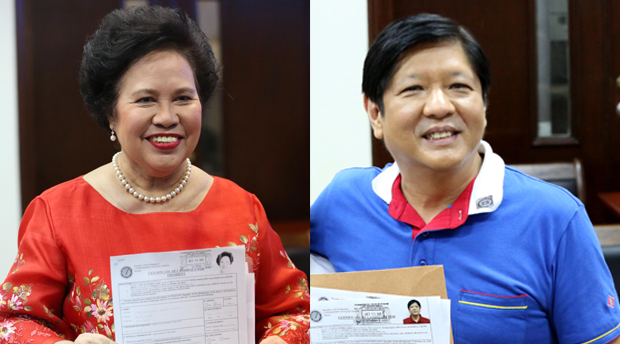A nonnegotiable narrative
Sen. Miriam Defensor Santiago, who took a leave from her Senate duties because of illness, surprised everyone by filing at the last minute her candidacy for the presidency in the 2016 election. On the same occasion, she sprang an even bigger surprise on her young awestruck fans: Bongbong Marcos is her choice for vice president.
Visibly flattered, Bongbong, who had earlier filed his candidacy for the vice presidency, issued a statement confirming he had indeed talked to Miriam’s husband, Jun Santiago. Yet, he would not categorically say that they had reached an agreement. That, to me, is significant.
Article continues after this advertisementFacing her supporters after the brief filing process at the Commission on Elections,
Miriam conceded that the partnership with the scion of the martial law dictator might appear “strange,” but that she would rather call it “a new development.” She, no doubt, had in mind critics of the Marcos dictatorship who are offended that Bongbong staunchly defends his father’s record as president and dismisses the human rights violations and corruption committed under his rule as things from which we should all move on.
Miriam appears to echo the young Marcos’ line in some of her pronouncements. For example, on the longstanding controversy over the Marcos family’s persistent demand for a hero’s burial for its patriarch, she said: “Why should we let a dead man control the actuations of the living and its new millennial generation? We should let go of the past.”
Article continues after this advertisementREAD: Miriam Santiago admits Bongbong Marcos team-up ‘strange’
Indeed, from one standpoint, there may be nothing strange at all about a possible team-up between Miriam and Bongbong. This partnership meets all the criteria by which the chances of a presidential-vice presidential tandem are conventionally measured. First, there is the hoped-for fusion of two large voting regions: in this case, the Ilocano base of the Marcoses and the Visayan base of Miriam. Second, there is the implicit attractiveness of an alliance of two generations, the old and the new.
Third, there is the underlying message of two politicians of widely differing backgrounds coming together for a common cause—one coming from a middle-class professional family, and the other from the traditional political elite. And, finally, the Miriam-Bongbong match-up seems a perfect carrier for the message of national unity and reconciliation.
This last one is worth discussing at length if only because Bongbong anchors his entire political ambition on his improbable claim to being a figure of national unity. I think the only way this claim can gain some credibility is if Bongbong can find individuals who have been victims of martial law who are prepared to endorse his bid for higher office. Juan Ponce Enrile, who recently raised Bongbong’s hand, would not count as a credible endorser even if he turned against Marcos in the dying days of the dictatorship, because he was the chief martial law administrator for the greater part of that regime.
But, then, neither would Miriam.
When she was a judge, Miriam ruled against the enforcers of martial law by allowing student activists from the University of the Philippines and Ateneo, who were charged with illegal assembly, to post bail so they could return to their classes. This singular assertion of judicial autonomy under martial law made her an instant hero to the antidictatorship movement.
That decision established her credentials as a brave professional lawyer and subsequently launched her political career in the post-Marcos years. But, to my knowledge, she was never an active participant in the long campaign to topple the dictatorship, nor, for that matter, was she ever a victim of the atrocities of martial law.
Indeed, I could sense a little uneasiness—perhaps, even ambivalence—on Miriam’s part as she tried to defend the right of the Marcoses not to apologize for the abuses committed during martial law. I surmise this is due in large part to the fact that she knows she has no right to speak for the victims of martial law.
But, there could be a more important reason. She knows that netizens, who admire her for her irreverence and who constitute the bulk of the millennial generation she claims as her constituency, are not totally indifferent or clueless about martial law. She is aware that they deserve a more convincing account of that period than is contained in her legalistic attempt to cut the Marcos children some slack by suggesting they did not participate in policy decisions.
Miriam said: “It is still important to go over the details of martial law in the country so we will know what path we shall take for the millennials. I do not especially agree, and I beg the pardon of Mr. Marcos, that the details of martial law deserve to be buried and forgotten. No. On the contrary, the historians of tomorrow should make the study deeper so that we will know what lessons they held for our future.”
I am sure her fans cannot agree more. But, I doubt if Bongbong shares that view, as benign as it may be. Let us not forget that he was not exactly an outsider to what was happening in Malacañang, particularly in the last years of the Marcos regime. He adores his father. To this day, he believes that his father did what was necessary when he declared martial law in 1972, and that he was on the right track until the Americans intervened to drive him out of office during the crisis that followed the brutal assassination of Ninoy Aquino. I don’t know if Miriam is ready to say that.
Unless Bongbong finds a presidential candidate who will subscribe to this nonnegotiable narrative, I think he will be running alone.
* * *
public.lives@gmail.com
RELATED STORIES
Miriam Santiago: PH will be much better if I become president
The Marcoses never really left home

















